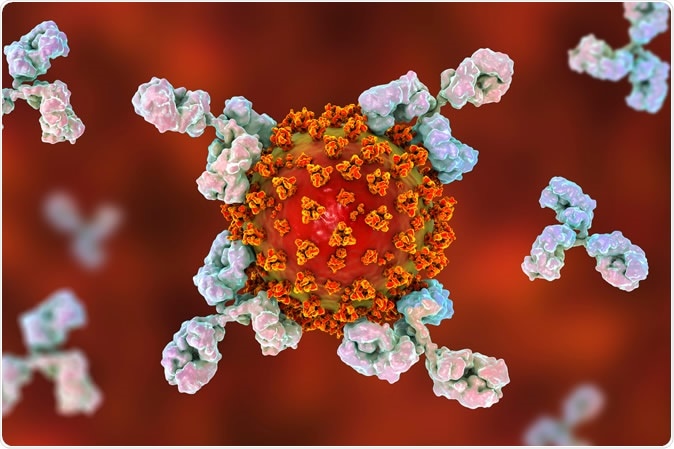Amid the coronavirus pandemic, health experts warn against the use of antibody tests to determine if a person has immunity against the severe acute respiratory syndrome coronavirus 2 (SARS-CoV-2). An antibody test determines if a person developed antibodies against the infection due to past exposure.

Antibodies attacking SARS-CoV-2 virus, the conceptual 3D illustration. Image Credit: Kateryna Kon / Shutterstock
A group of medical experts has raised concerns about coronavirus antibody testing being carried out on NHS and care staff. Despite the claim of British Prime Minister Boris Johnson that the blood test is game-changing and can determine who has been previously infected, the experts said that a positive result in the test does not guarantee lasting immunity against the deadly virus.
The U.K. government purchased about 10 million test kits from the pharmaceutical firms, Abbott and Roche, aiming to test NHS staff and care workers first.
“The government will be providing laboratory-based tests in the first phase of our antibody testing program, to NHS and care staff. Clinicians will also be able to request the tests for patients in both hospital and social care settings if they think it is appropriate. These tests require blood samples to be taken by trained professionals, which means they are not suitable to be used at home,” the Department of Health and Social Care said.
What is antibody testing?
Antibodies are immune-fighting proteins released when the body’s immune system detects an infection. Once the infection has resolved, memory antibodies circulate in the blood at low levels, and when infection with the same pathogen happens again, the immune system ramps up the production of these proteins, warding off the viral infection.
The antibody test or serologic test detects the presence of antibodies against a pathogen, hinting a previous exposure. Many viral diseases provide lasting immunity against the virus, which means that once a person gets infected, the body can fight off the infection.
Testing positive for coronavirus-specific antibodies suggests that a person has some protection against the infection. However, there is no guarantee of lasting immunity, and it is unclear how long a person will be protected.
Health experts warn that antibody testing may provide false hopes of immunity and can put at risk the health of those who assume they are immune to the virus.
No firm proof
The senior medical experts, in a letter published in the British Medical Journal (BMJ), said they have concerns about the establishment of antibody testing in England. First, the health experts say there is no specific clinical indication for the test, and the test kits have not been assessed and tested yet.
“We support the rapid provision of diagnostic tests for individual and public health and recognize the need to deliver at pace. It is essential, however, that quality systems, which have evolved over many years and are the foundation for delivering the right result of the right test to the right person at the right time, are not circumvented,” the team wrote in the letter.
Further, the team says that the antibody tests being rolled out detect immunoglobulin G (IgG) antibodies and since the test is performed to patients who want to have it, rather than for a clinical indication, neither a positive nor negative result may alter clinical management a positive test may not indicate immunity.
The tests will also be used as a “ticket” for healthcare workers and other employees to work. It is essential to understand that even with positive antibody test results, they should still consider themselves at risk and follow infection control guidelines.
“There is, therefore, no benefit to healthcare organizations or to others in knowing the status of employees at present,” the researchers added.
Another issue raised by the scientists was that the antibody tests being used in the U.K. had not been evaluated well enough to prove that they yield accurate results. Also, they were not being evaluated on enough people with other illnesses, to see if the tests will cross-react and show positive results for a different kind of infection.
“Those who are at the highest risk of death from this infection are elderly people, those from black and minority ethnic groups, and immunocompromised people. There are currently no data showing the performance of the tests in these groups. The correct route to generating valid test performance data is well designed for prospective clinical studies. The assay is being rolled out at an unprecedented pace and scale without adequate assessment, potentially compromising public trust in pathology services in the future,” the team added.
The experts said that the only current justification in rolling out a large-scale antibody testing for the novel coronavirus is for research purposes.
Source:
Journal reference:
- Andersson Monique, Low Nicola, French Neil, Greenhalgh Trisha, Jeffery Katie, Brent Andrew et al. Rapid roll out of SARS-CoV-2 antibody testing—a concern BMJ 2020; 369 :m2420, https://www.bmj.com/content/369/bmj.m2420